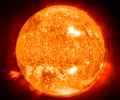


Much of physics, if indeed not all physics, is about asking questions. And in astrophysics the range of the questions seems almost limitless. Indeed they extend into the area of metaphysics and touch borders with religion.
One of the well known basic questions (attributed to Olber but in fact raised by Kepler over two hundred years earlier) was, and is, "why is it dark at night". A simple question that any of us could ask though many of us don't because firstly we take it for granted and secondly many of us do not have the insight to even understand the significance of the question. The fact that it is dark at night implies that the Universe is not infinite in its extent and of course that then raises the question as to what might lie beyond the Universe. At this point we really begin to get into deep, metaphysical water.
Another question we could ask , since we know that gravity is an attractive force only, is why does the Universe appear to be so stable; why has it not long since been attracted into itself to form one enormous black hole?

IMAGE - Why hasn't the Universe collapsed in on itself?
Please move mouse over image
When things are under the influence of a force they are accelerated and thus move. If they do not move, or move very slowly, then either the forces are weak or they must be almost in balance with some opposing force.
So what we need to do is to ask ourselves what those opposing forces are; the opposing forces which stop the Earth from collapsing in on itself, or stopping the Earth falling into the Sun, or stopping the Sun from collapsing, or the stars in the Galaxy coalescing, or the galaxies in their clusters of galaxies. Finally why doesn't the Universe collapse? We can also ask whether such a state is actually permanent or just transitional, albeit on a long timescale.

|

|

|

|
IMAGE - four images showing the Earth, the orbiting Earth around the Sun, the Sun and the Sun orbiting our galaxy. What are forces are making these systems so stable?

